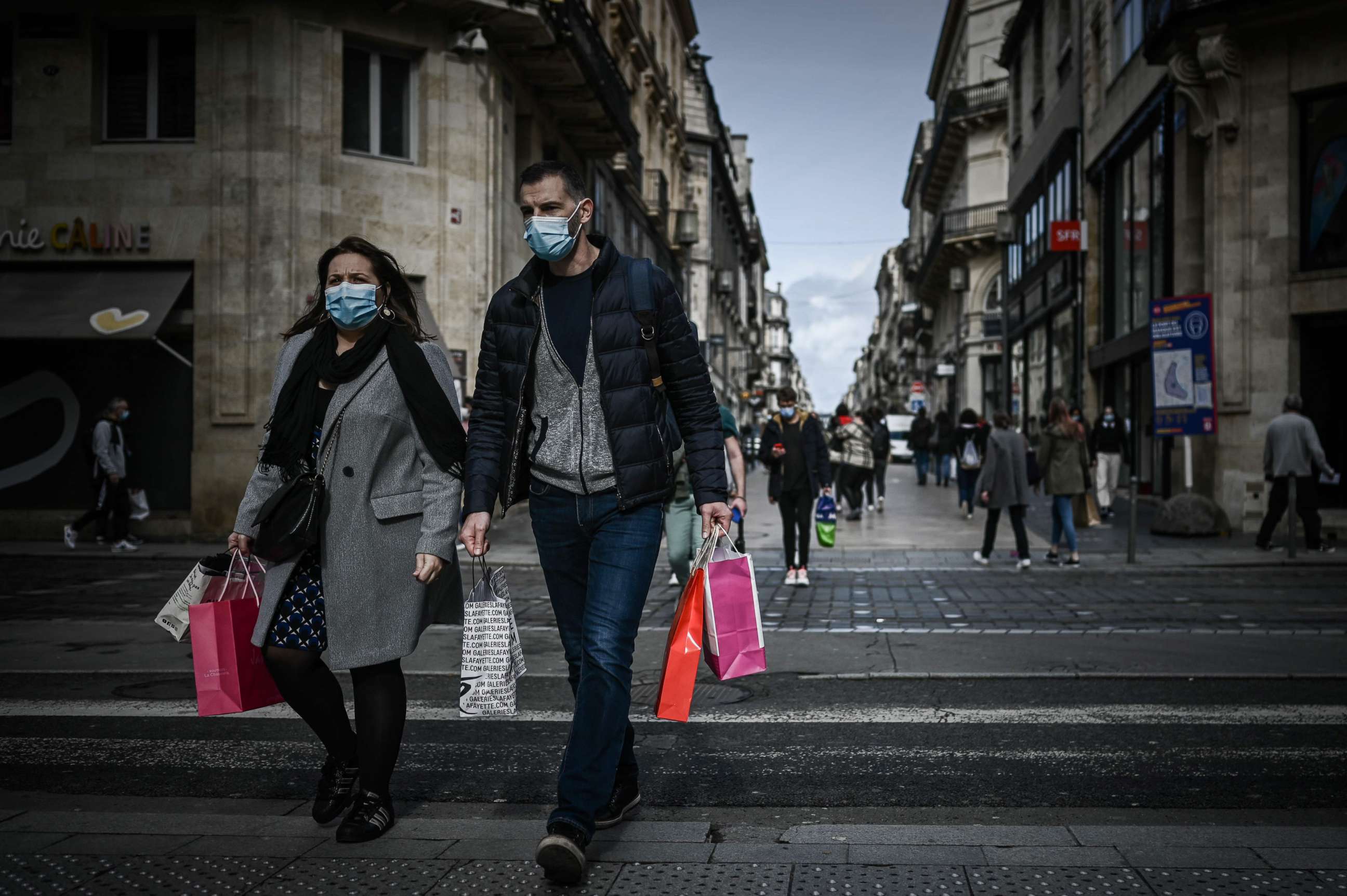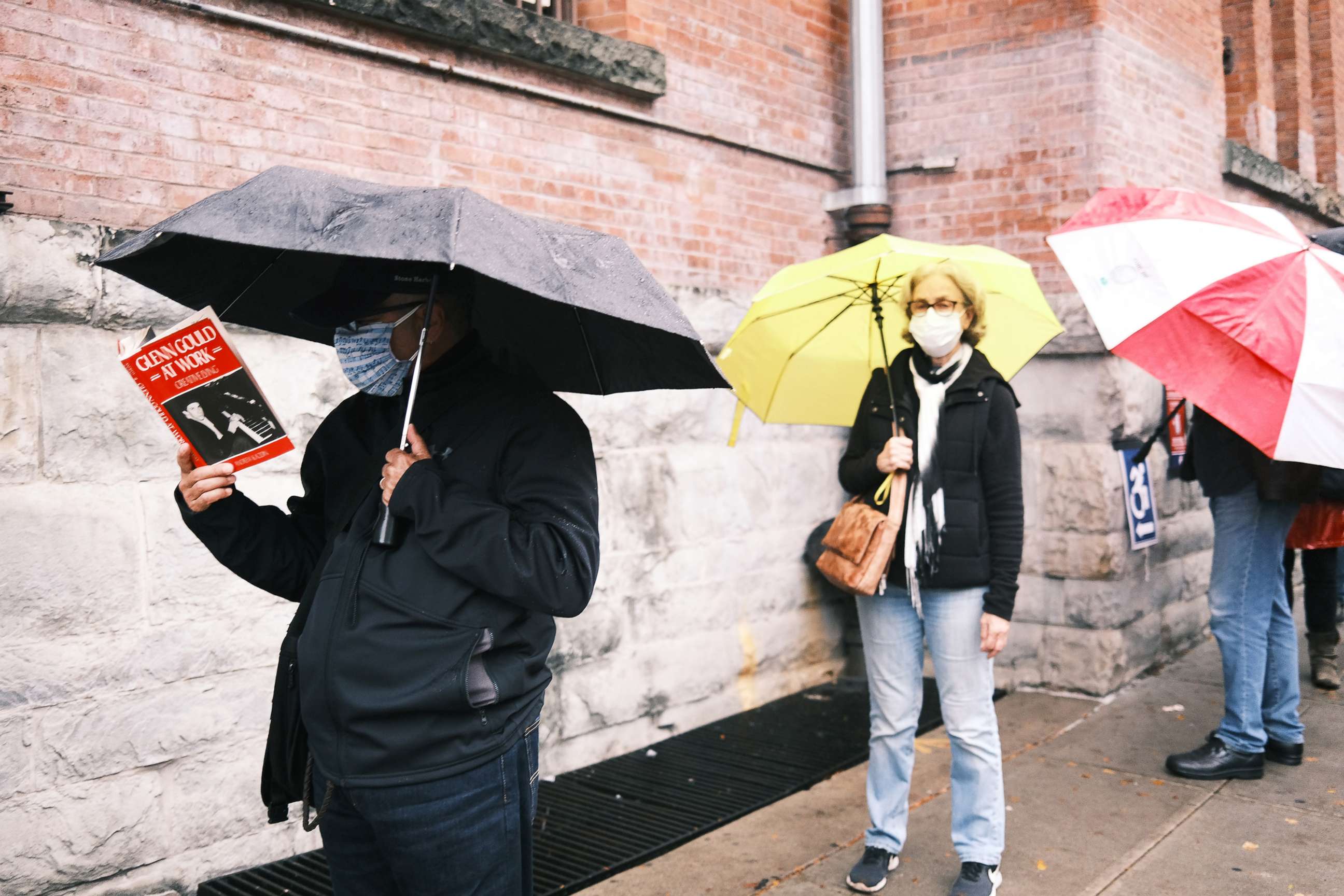How to combat 'COVID fatigue': Medical experts on what works -- and doesn't
The public is urged to be vigilant as a difficult winter approaches.
They're images that are hard to reconcile -- COVID-19 cases surging to record levels, overwhelmed hospitals and intensive care units and maskless Americans jamming into restaurants, bars and political events, flouting social distancing rules and recommendations.
Similar scenes are playing out in some countries around the world, where more than 1.2 million people have died and there are hundreds of thousands of cases stacking up each day -- a far cry from the fear, uncertainty and general solidarity around stopping the virus in the spring.
President Donald Trump appeared to sum up the sentiment of fatigue in a recent campaign call: "People are tired of COVID. Yep, there's gonna be spikes, there's gonna be no spikes, there's gonna be vaccines—with or without vaccines, people are tired of COVID."
In this environment, public health officials are warning of "COVID fatigue" as the coronavirus pandemic has stretched on for seven months.
From Belgium to Bismarck, North Dakota, leaders and doctors have addressed the effects of prolonged social distancing measures, while urging people to remain vigilant as what will likely be a difficult winter approaches and cases are rising in almost every state.

New York Gov. Andrew Cuomo hammered the point home at one of his daily press briefings last month: "COVID fatigue is, we've been doing this a long time, I thought it was a short-term situation, it's going on and on and on and I'm getting tired of it, and I'm tired of wearing a mask, and I'm tired of putting my life on hold.
"COVID fatigue can lead to less discipline, less compliance," he continued. "Bad time for that to happen when the virus is increasing."
Lax enforcement and observation of health protocols are just one part of COVID fatigue; the mental health toll is another. Prolonged grief and major depressive disorder, as well as symptoms of post-traumatic stress disorder, are a concern, medical professionals recently noted in JAMA.
"Throughout pandemics, the psychological footprint is often way bigger than the medical footprint," Dr. Claude Mellins, a medical psychologist who co-leads a pandemic initiative called CopeColumbia for the Columbia University Irving Medical Center community, told ABC News.
One of the challenges is the pandemic makes it hard to turn to our normal coping strategies, such as being with people and engaging in fun activities, said Mellins, a professor of medical psychology in the Psychiatry Department at Columbia University Irving Medical Center and the Sociomedical Sciences Department at the Mailman School of Public Health.
People are "feeling unbelievably anxious of the uncertainty, and so they don't want to be isolated, and they don't want to do some of the things that we need to be there," she added.
In the face of COVID fatigue, people are continually urged to not let their guard down. But how can public health officials accomplish this?
'We're going to get through this'
One message that Mellins has been conveying to her faculty is one of resiliency and hope.
"We're gonna get through this," she said. "That's the first message of any disaster. It doesn't mean we're not going to be unchanged, but we will get through it."
"It's definitely hard, but it will end," she added. "It's easier to get through something when you know it's not forever."
Dr. Georges Benjamin, executive director of the American Public Health Association, also emphasized that message.
"I remind people that there will be an end to this," he said. "It's continuously evolved, but it will end."
One positive: When cases have gone up, behaviors like mask-wearing and reduced mobility have also increased, Dr. Ali Mokdad, a professor of health metrics sciences at the Institute for Health Metrics and Evaluation, told ABC News.
"We have seen that in July and August," said Mokdad, pointing to Florida, Arizona, Texas and California as examples of places where cases were going up. "We've seen a rapid increase in masks, we've seen a decline in mobility, and the cases started coming down. So I'm very hopeful. I would have loved for it to be different. But I'm hoping, as the cases are unfortunately surging, people are going to start paying attention."
Following set decision-making frameworks
One part of what makes the pandemic so exhausting is having to continually make decisions, Elizabeth Stuart, a professor in the Department of Mental Health at the Johns Hopkins Bloomberg School of Public Health, told ABC News.
"Should I go to a restaurant today? Should I go to the grocery store? Can I go to work safely? Can my kids play with their friends? It is exhausting if you try to tackle each decision individually," Stuart said.
That's where those "core public health tools," like being outdoors if possible, wearing a mask and physically distancing, can help make those decisions, she said. People can also consider ways to use those tools creatively, she said, such as creating a small pod of people with which to socialize.

"In order to get through the winter, we are going to need some ways to socialize, and so finding a small -- like fewer than 10 people -- group where you can all have a common understanding of what you're doing to keep each other safe in a way that you can then interact with each other and socialize together, I think can really make a huge difference," she said.
Decisions around socializing will also come into play over the holidays. People will need to think about how they're going to approach family get-togethers, such as via Zoom or through quarantining, and make a plan, the medical experts stressed.
"We should recognize we're going to do the holidays differently," Benjamin said. "We should just plan for it, so it just doesn't come up on you."
Socializing will require really frank conversations about your expectations. "You don't want to get into a situation where people aren't on the same page and you are exposed to more risk than you really were expecting," Stuart said.
Reframing the negative
A harm-reduction approach, particularly one that emphasizes social distancing, has been a major part of public health messaging during the pandemic. Though another key part of that is "meeting people where they are," Stuart said, and helping people learn what they can do -- safely.
"Instead of giving a list of things people shouldn't do, give a list of the things they can do and the tools to do so safely," Stuart said. For instance, "you can see your friends, just try to do it outdoors instead of indoors. Eat at a park instead of an indoor restaurant."
Similarly, for Mellins, it's all about reframing preventative behaviors to focus on the positive.
"People don't do things just to avoid the negative," she said. Instead, it's important to help people "identify the positive reasons for doing all of this."
"People are more likely to engage in behaviors when they can figure out what's positive about it for them, or what they can be contributing to the public health good or the well-being of others," she said.
Related to that, shaming isn't very effective, she said.
"I don't think there's any evidence you can sustain behavior by shaming," she said. "That's really important. When we're trying to get people to stay with behaviors, shaming is just not going to go very far. The flip of that is helping people identify positive reasons for doing all of this."
Addressing increased stress and anxiety
A Kaiser Family Foundation poll conducted in mid-July found that more than half of U.S. adults said their mental health has been negatively impacted due to worry and stress over the coronavirus.
To help manage stress, Mellins recommended doing things to "ground yourself," whether that's cooking or yoga or an activity that brings you joy, and find ways to safely focus on them.
Taking care of your body is also key, Benjamin said, from staying physically active to eating well, and "realizing that we're in control of this to some degree."
Recognizing what you're feeling and asking for help when you need it is also important, both experts said.
"Asking for mental health help is a sign of strength, not weakness," Mellins said. "It is much easier to engage in health behaviors when you're feeling like the ground is beneath your feet and you're in a solid place."
What to know about the coronavirus:
- How it started and how to protect yourself: Coronavirus explained
- What to do if you have symptoms: Coronavirus symptoms
- Tracking the spread in the U.S. and worldwide: Coronavirus map
Tune into ABC at 1 p.m. ET and ABC News Live at 4 p.m. ET every weekday for special coverage of the novel coronavirus with the full ABC News team, including the latest news, context and analysis.ng




